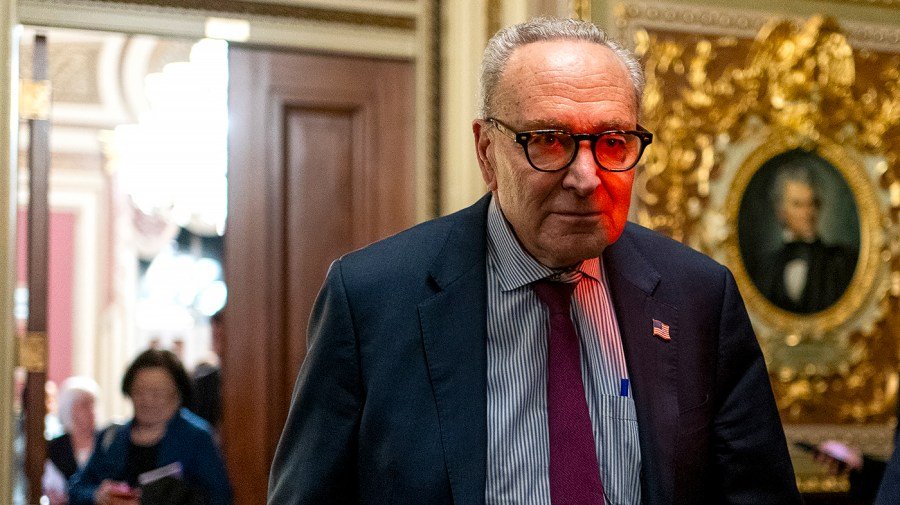
Senate Minority Leader Chuck Schumer (D-N.Y.) has become the target of progressive anger after moderate Democrats struck a deal to reopen the government, raising questions about his future atop the conference even as he distances himself from the agreement.
Progressives, both those in the House and those running to join Schumer in the upper chamber, did not hesitate to lay blame at the feet of the New York senator, arguing that his ineffectual leadership led eight Democrats to cut a deal with Republican leaders to reopen the government in the coming days.
But notably, that public anger has not extended to the upper chamber. A number of Democratic caucus members said that while they remain upset with how the shutdown turned out, they don’t agree that Schumer deserves the blame for it.
Still, it marks the second time in eight months that Schumer has drawn the ire of the progressive wing of the party, having backed a clean funding bill back in March that fueled questions about his tenure atop the Democratic caucus.
“He has a tough job,” said Sen. Richard Blumenthal (D-Conn.), who was a vocal supporter of keeping the government shut down and keeping up the fight over the expiring ObamaCare subsidies.
“The Republicans forced an impossible false choice between affordable health care and reopening the government,” he added.
The Democratic leader made a concerted effort to avoid a repeat of what he endured with his March vote to keep the government open, having held meetings with his caucus months out to game out the government funding fight.
That helped lead the party into a nearly month-and-a-half long fight that many were willing to keep going for the foreseeable future, especially after last week’s election results buoyed the feelings among the Democratic base.
Nevertheless, Schumer is experiencing blowback déjà vu. Multiple high-profile Senate hopefuls said they were against him continuing on as leader in the aftermath of the deal.
“People want new Senate leadership more than they want a new senator,” said Graham Platner, a Maine Democrat who is running to take on Sen. Susan Collins (R) next year.
Scores of House members made similar calls for him to be removed from his post. Rep. Ro Khanna (D-Calif.) was among the first to do so, arguing that Schumer is “no longer effective, and that if “you can’t lead the fight to stop healthcare premiums from skyrocketing for Americans, what will you fight for?”
Schumer, however, is getting much needed backup from Democrats on Capitol Hill.
House Minority Leader Hakeem Jeffries (D-N.Y.), who notably declined to throw Schumer a lifeline in March, on Monday defended his fellow New Yorker, saying he “waged a valiant fight on behalf of the American people” and noting he didn’t vote for the deal.
Rank-and-file members agree.
“It’s understandable. He’s the leader and it goes with the territory,” said Sen. Peter Welch (D-Vt.). “But I would be hopeful that we’d focus on our adversary, and that’s [President Trump].
“It reflects some frustration with him as people see it,” Welch continued. “We came together on the shutdown, and that’s a very perilous and extreme tactic, and Schumer had an open caucus and everybody had a chance to make their say, so people appreciated the openness of it. … That’s different than last time.”
Welch particularly praised Schumer for keeping the caucus together for as long as he did, especially given the “disparate viewpoints” across the spectrum. He also argued that while the Democratic election victories were a boon to the party, it made the prospect of striking a deal more problematic.
“It’s harder in the aftermath of the totally upbeat outcome of the elections. All of our expectations rose,” he said. “Everyone is getting their hopes up that we can win. Trump could care less.”
Even though Schumer voted “no,” progressives have pinned the blame on him by arguing that he either does not have the needed sway in his post or allowed the group of eight Democrats — all of whom are either retiring or not up for reelection until at least 2028 — the green light to cut a deal.
The Democratic leader has been a vocal opponent of the deal. On Monday, Schumer declared that the minority scored a key win during the course of the stalemate by elevating the issue of rising health care premiums and costs, all the while putting the onus on Republicans to fix the issue.
“Republicans now own this health care crisis. They knew it was coming,” Schumer said on the floor. “We wanted to fix it. Republicans said no. And now it’s on them.”
Senate Minority Whip Dick Durbin (D-Ill.), one of the eight Democratic “yes” votes,” told reporters on Monday that Schumer gave “neither a blessing or a curse” to members of the caucus who decided to back the eventual agreement. He also conceded that the leader was not in an enviable position this go-around.
“I think Chuck handled this well. It was a hard assignment,” he said.
Democrats on both sides of the vote-tally sheet also said that Schumer’s standing in the caucus is also in a stronger position compared to the spring after his vote for the continuing resolution.
“Yes, he is,” said Sen. Tim Kaine (D-Va.), citing the “mood of the caucus.”
That doesn’t mean everyone is publicly going to the mat for him. When asked if the criticism of Schumer lately has been fair, Sen. Elizabeth Warren (D-Mass.) demurred.
“I haven’t heard it. I don’t have comments about what other people have to say,” Warren said, declining also to discuss his standing in the conference. “I don’t have a comment on that.”


